- Home
- Brian Hodge
Falling Idols
Falling Idols Read online
Table of Contents
Stick Around, It Gets Worse
A Loaf Of Bread, A Jug Of Wine
Blind Idiot Lovecraft
Graphic Arts
The Dripping Of Sundered Wineskins
Sensible Violence
Cenotaph
As Above, So Below
Endnotes: Paradise Burned
About The Author
FALLING IDOLS
by Brian Hodge
FALLING IDOLS copyright © 2011 by Brian Hodge. Originally published 1998 by Silver Salamander Press. Macabre Ink digital edition published 2011. Cover by James Powell.
All rights reserved under International and Pan-American Copyright Conventions. Except for review or discussion purposes, no part of this text may be reproduced, transmitted, downloaded, decompiled, reverse engineered, or stored in or introduced into any information storage and retrieval system, in any form or by any means, whether electrical or mechanical, now known or hereinafter invented, without the express written permission of the author.
This book is a work of fiction. Characters, incidents, and dialogue are drawn from imagination and are not to be construed as real, or are otherwise used fictionally. Any resemblance to actual events or persons, living or dead, is entirely coincidental.
License Notes
This eBook is licensed for your personal enjoyment only. This eBook may not be re-sold or given away to other people. If you would like to share this book with another person, please purchase an additional copy for each person you share it with. If you're reading this book and did not purchase it, or it was not purchased for your use only, then you should return to the vendor of your choice and purchase your own copy. Thank you for respecting the hard work of this author.
Also From Brian Hodge & Crossroad Press
Novels:
Prototype
Collections:
The Convulsion Factory
Buy Direct From Crossroad Press & Save
Try any title from CROSSROAD PRESS — use the Coupon Code FIRSTBOOK for a one-time 20% savings! We have a wide variety of eBook and Audiobook titles available. Find us at: http://store.crossroadpress.com
Original Publishing Credits
Stick Around, It Gets Worse © Brian Hodge, 1996. First appeared in Darkside: Horror for the Next Millennium.
A Loaf Of Bread, A Jug Of Wine © Brian Hodge, 1993. First appeared in Frankenstein: The Monster Wakes.
Blind Idiot Lovecraft © Brian Hodge, 1998.
Graphic Arts © Brian Hodge, 1993. First appeared in Bizarre Bazaar.
The Dripping Of Sundered Wineskins © Brian Hodge, 1996. First appeared in Love In Vein II.
Sensible Violence © Brian Hodge, 1997. First appeared in Brutarian.
Cenotaph © Brian Hodge, 1998. First appeared in In the Shadow of the Gargoyle.
As Above, So Below © Brian Hodge, 1998.
Endnotes: Paradise Burned © Brian Hodge, 1998.
Once more, for D.J.
How you shine.
What is the curse upon religion that its tenets must always be associate with every kind of extravagance and falsehood.
— Aleister Crowley, Book 4
I became aware, more vividly aware than I had ever been, that the secret of life consists in sharing the madness of God.
— John Cowper Powys, Autobiography
Stick Around, It Gets Worse
You weren’t there when it happened, but you’ve spent so much time imagining what she went through during those final moments that she was aware of the world around her, you feel as though you were. You know the details pieced together by forensics experts analyzing the crime, and these feed you plenty of insight, but you knew her as the experts never could.
Remember the swoop of hair that would mask her left eye, and the way she’d always be pushing it back with two fingers, never three, and how that eye, when revealed, seemed to notice something worthwhile in you that no one else could recognize? Remember the way she would listen to music, sitting with folded legs upon the floor, doing nothing, just listening? Remember her penchant for giving money to downtrodden panhandlers and her tolerant smile when you complained, a smile that made you feel so small, so petty, so much less formed a creature than she was? Of course you remember. You remember everything, and still so clearly. Somebody has lied — time hasn’t healed a thing, not for you.
The experts only knew her post-mortem; knew her unconscious, bleeding in the wreckage of her car; knew her clinging to life while her head was undergoing emergency reconstruction; knew her in the morgue’s cold stainless steel drawer. Knew her just enough to tell you that she never once regained consciousness during those last nine hours. Knew her just enough to assure you that even had she lived, she’d never be right again, not the person you married, because the brain damage was just too extensive.
And you?
They didn’t even know you at all. If they did they wouldn’t have tried to make you see her death as merciful.
You’ve lost track of how many times you’ve found yourself right there beside her. She’s driving her customary fifteen miles per hour above the speed limit on the Landry Expressway, and busy with the radio, while notched between her thighs is a tall paper cup of Thai iced coffee, her summer drink of choice. Thinking of work, or getting home, or the way you will feel together later in the night, another joyously fevered coupling to make a complete world between your flesh, just the two of you and nothing and no one else. You’re flattering yourself, naturally, imagining her last thoughts to be of you, but that’s all right. It’s allowed. Something in you, never touched by daylight, needs to ache so much it makes you groan in the still, small hours.
She approaches the overpass and you see it coming from miles away, it feels like, but no matter how loudly you scream warnings it never does any good. How little it would take to change things: A flex of her wrist and she’d be in another lane, and that might be enough. Somebody else would be bearing this burden, and right now you’d gladly wish it on him. But it’s yours, always and forever. It became yours the instant the brick thrown from the overpass smashed through the windshield and pulverized the left side of her head. You wonder, crazily enough, if she just didn’t see it coming because her hair was in the way.
Vandals, a young police officer told you. They’re pulling these stunts all the time, and he doesn’t think they have any real appreciation of the kind of damage they can cause.
The hell they don’t, you thought, didn’t bother saying. They know exactly what can happen, it’s what they’re hungry for, and the only thing that might’ve bothered them was that she didn’t kill anyone else when her car went out of control. Ruining the lives of others, they’ve made this the mission of their own.
At the funeral, family and friends and clergy were brimming with the same big question that, in a moment of weakness, scrawled itself on the front of your brain as soon as you got the phone call: Why? Everyone wanted to know why. A few, desperate to dredge up some comfort at bargain basement cost, spoke in platitudes — God’s will, all shall become clear one day — and you would force yourself to swallow the bile, if only for her sake, knowing she wouldn’t have wanted you punching anyone at her funeral.
“God’s will?” you contented yourself with repeating, after hearing the phrase one too many times. “I can’t decide what’s more monstrous: a god who sends little thugs up onto a freeway overpass with bricks to do his dirty work, or the way people believe that a god like that actually exists.”
Their blind trust has never made sense to you, nor the meager delusions to which they cling as proof of being rewarded for their faith. It’s not quite in you to feel smug because you know better, but lately it’s not quite in you to pity them their superstition, either. Mostl
y it’s disgust that you feel. They call you lost, but that’s just projection, you deduce, because you’re the one who’s comfortable right where you are, realizing there’s no reason for anything that happens, ever. How they hate that, because it grants you a freedom they will never know. A freedom that would paralyze them if they did.
You remember something you read years ago, written by Stephen Crane, and how deep within you resonated the chord it struck: A man said to the universe, “Sir, I exist!” The universe replied, “That fact has not created a sense of obligation in me.”
You take your comfort in the oddest places, don’t you?
*
By autumn, grief has become something permanently affixed to you, like a boil grown too thick to be lanced, drained. It must grow until it bursts, or turns to silently consume you from within. Your friends understand — she truly was everything to you — while you in turn understand their reluctance to be around you these days. You just aren’t that much fun anymore.
She was the last straw, that broke the camel’s heart.
It’s got you thinking — you’ve never really known anyone who’s died of natural causes, have you? Parents and grandparents, plus friends and neighbors and casual lovers, they’ve all left you too early, and in such ghastly ways. Cancers and violence, accidents and congenital defects, aneurysms of the brain and psyche. You’ve heard of people who’ve slipped peacefully away in their sleep, or in their favorite easy chairs, after ripe octogenarian lives, but suspect they must be mythical, in the company of unicorns and mermaids.
If you didn’t know better, you’d think there was a deliberate methodology behind it all, a gradual pattern of calamity spiraling inward until, at last, you’re the only one left to be dealt with. You could be expected to think that, but don’t, because you still keep your wits about you, thank god—
So to speak.
While fall’s vainglorious colors deaden to rusts and browns, and drab wet shadows lengthen across the city, you feel yourself trapped in freefall. The most appealing thing you can think of is the end of it all, by chance or by your own determined hand … yet a spark of hope lingers on, that maybe there’s something out there worth surviving for, if only you could find it.
It turns you into as restless a wanderer as any junkie hoping to score, as an insomniac, as one of Arthur’s knights looking for the Holy Grail. Shoes married to the pavement, you submerge within the wretched refuse. The teeming shores begin at the stoop of the building where you used to live with her. Where you sleep, still, although you seem to have quit living months ago.
You don’t even know what you’re seeking, do you? Only that it’s entirely up to you to find it, to make of it your new life and purpose. Nothing and no one else can do this for you. You take heart, for it can be done: Life, like death, can be as random and abrupt as a brick hurtling from overhead.
*
“Now you take me, for instance,” says Stavros, the old gentleman you’ve come to know and like. “My whole family killed in the war and me just eleven years old. Would I be coming to this country if this hadn’t happened? No, no, I don’t think so. All this life I’ve had here? It would be unknown to me.”
Mornings, before work, you’ve taken to stopping by a sidewalk cafe where Stavros holds his solitary court, drinking cup after cup of coffee. Against the autumn chill he wears a bulky knit sweater and on his head a flat billed cap, and if back in Greece he would look like any ordinary fisherman. Here, though, he seems exotic, a rogue and an adventurer.
“Do you ever think you’d’ve been better off if things had just stayed the same?” you ask.
He laughs, showing his great mouthful of strong, stained teeth. “Never. God rest their poor souls, every one of them, but these were people, let me tell you, who’d clutch a child to their bosoms ‘til it suffocated. It wouldn’t have been a bit different with me.” Stavros peers into his coffee, the twinkle in his eye sharpening into something more cunning. “I was liberated. Freed to become all the things that my first life kept away.”
He tells you stories, as he does each morning since you first paid him attention. Tells you what it was like to cross an ocean and see the world unfolding with eleven-year-old eyes. You listen, and you breathe in the scents of coffee and buses, watching both his seafarer’s face and the brisk sidewalk passage of everyone who, unlike you, is going to arrive at work on time this morning.
He’s the only friend, new or old, who doesn’t seem to mind being around you. And you wonder: Which of you is more desperate for a companion?
You’re not sure when you first became aware of it, only that it seemed to imperceptibly creep up on you. Something you might’ve noticed the moment you sat down but only acknowledged after nearly an hour: Someone is waving at you. Across the busy street and down one building; a second floor window, ornately archaic, in contrast with the more modern storefront below. Few ever pay any mind to the extinct architecture above their heads. Amazing, the way gargoyles can hide in plain sight.
It’s no one you know — you’re quite sure of it, just as you’re sure it’s you this woman is waving at. Even from across the street you can see how white and pasty her skin is, her thick and naked shoulders sloping beneath greasy straggles of dark hair. Modesty isn’t her virtue, obviously, and you watch, half-fascinated, half-repulsed, as her breasts squash against the window.
A vivid red grin, the only true color about her, splits her face when she realizes that you notice her.
“Do you … see that?” you ask Stavros, and point.
But even as you ignore her frantic overtures for you to come up, come up and join her, you have the feeling that just as this invitation is for you alone, so is the sight itself.
“See what?” he says.
“I…” You shake your head. “I should be getting on to work,” and when you’re halfway down the block curiosity gets the better of you, and you turn around to see her waving goodbye — or at least until next time.
*
The skin condition begins like a common rash, spreading and intensifying from there, from scalp to face, down to your neck and shoulders and chest, your back and arms. A great portion of your waking hours are simply spent scratching an itch that never feels sated, and within days you can scarcely bear to pass before a mirror. Scaly red patches, some crusty from too much scratching … you don’t wear them well, but then who does?
The dermatologist diagnoses psoriasis. What’s causing it, you want to know. Why? Together you rule out food allergies, various environmental irritants to which you may have exposed yourself. You’ve not changed these sorts of routines in quite some time.
“Of course,” says the doctor, “we can’t overlook an emotional component to this outbreak.”
Swell. You’re not even supposed to grieve properly?
Treatments begin, oral dosages of etretinate and sessions of outpatient ultrasound hyperthermia, but you don’t seem to make any improvement. To the contrary, you seem to be getting worse. It gets to the point where your boss thinks it would be a fine idea if you’d take sick leave. You’re not the only one relieved. This is welcomed by an entire office full of people to whom you must be becoming terribly aberrant. And at whom you’ve been increasingly tempted to scream, “None of you knows just how lucky you are, not a single complacent one of you!”
Stavros is the only one who doesn’t mind your appearance, but you’re wearing a hat pulled low these days, with your coat collar turned up, and bandages whenever your busy fingernails have left your face oozing. Camouflage has become a vital skill.
“No improvements,” he says, not quite a question, seeming to mourn for you.
You shake your head, wondering with shame who’s staring and who’s averting their eyes. When you’re not occupied with this you usually glance at the window where the strangely repellent woman waved to you. Although as far as repellent goes, you definitely feel a new sympathy toward her. You didn’t know what repellent was then.
You think
maybe you’ve seen her since, grinning from other windows, other doorways, catching your eye, then disappearing, as if teasing you. But there’s a certain innocence in teasing, and hers was lost long ago, if ever she possessed any at all.
Luring you, then? That’s more like it.
“If your doctors do you no good,” says Stavros, gritting that mouthful of brownish ivory, “then maybe you should go to another kind of doctor.”
“A second opinion,” you murmur. You’re reminded of an old joke. You want a second opinion? Okay: You’re ugly, too. “I don’t know any other kinds of doctors.”
And from the way Stavros smiles, you know he’s about to make one of his stranger pronouncements.
*
You’re not the type who would ordinarily frequent those who don’t hang M.D. shingles from their walls, but, relieved of your office duties, you have all this extra time. And Stavros speaks so glowingly of her, and she does live in his building, so you don’t have much of an excuse.
Ellen Medicine Crow is her name. Her father, Stavros told you, as a boy was given tutelage by the legendary Black Elk, although you’re not sure if you believe this. Quacks never stop seeking ways to boost their own stock.
“A shaman,” you say upon first encountering her. The irony isn’t lost on you. If your rationalist friends could see you now.
“I prefer healer,” she tells you. “It doesn’t sound quite as presumptuous. Or as intimidating.”
Intimidating. She’s that already, this Lakota woman. She must be near fifty, if not past it, but carries herself tall and strong and supple in a way that’s agelessly youthful. The only giveaway is the crinkles around her eyes. Her hair reaches her waist, black but threaded with strands of gray. Ellen Medicine Crow inspires your first sexual thoughts since she died, which frighten you with their suddenness, their power.
It’s no easier when you learn she wants to come stay with you for a few days. There’s so much she has to learn about you before she can help — if she can, she adds, which is the main reason you give in. You rather like the honesty of this kind of medicine, of someone who, unlike your usual physician, may be perfectly willing to declare your case a lost cause.

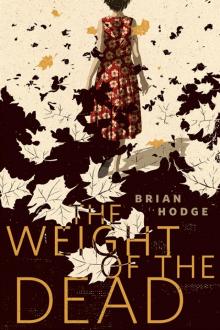 The Weight of the Dead
The Weight of the Dead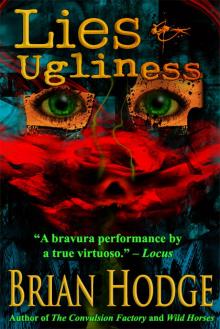 Lies & Ugliness
Lies & Ugliness The Convulsion Factory
The Convulsion Factory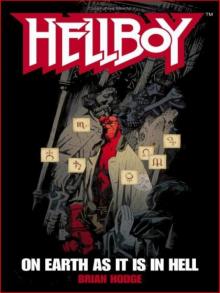 Hellboy: On Earth as It Is in Hell
Hellboy: On Earth as It Is in Hell Whom the Gods Would Destroy
Whom the Gods Would Destroy Picking the Bones
Picking the Bones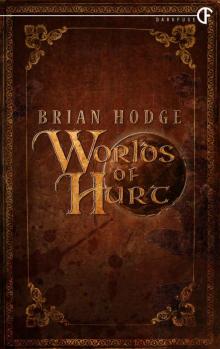 Worlds of Hurt
Worlds of Hurt Oasis
Oasis Nightlife
Nightlife The Darker Saints
The Darker Saints Just Outside Our Windows, Deep Inside Our Walls
Just Outside Our Windows, Deep Inside Our Walls A Haunting of Horrors, Volume 2: A Twenty-Book eBook Bundle of Horror and the Occult
A Haunting of Horrors, Volume 2: A Twenty-Book eBook Bundle of Horror and the Occult Dark Advent
Dark Advent Mad Dogs
Mad Dogs Prototype
Prototype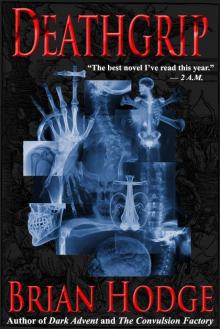 Deathgrip
Deathgrip Falling Idols
Falling Idols